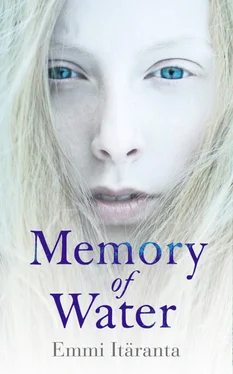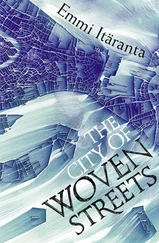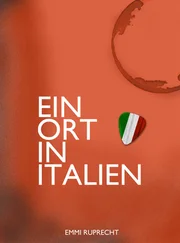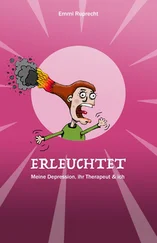The moon had only grown full once after I had dug the grave. The grass covering it was bruised and black earth showed through the stalks. Even though I saw it every day, my father’s death remained unfathomable and strange to me. I couldn’t place it in these rooms where his life had belonged. His imprint was so strong that it was like he still walked here, not knowing how to leave, stepping out of sight just as I turned around, leaving the teahouse right before I slid the door open. It was a gentle and sad presence, not a frightening one. I spoke his name sometimes, knowing he wouldn’t reply even if he heard me, wouldn’t place his hand on my shoulder. We inhabited different worlds now, and the dark river between us had only ever been crossed in one direction.
The queue moved forward and Sanja yanked the cart in which her family’s empty containers and my waterskins lay. Sand rattled in the wheels as they turned. There were still at least a dozen people ahead of us.
‘Fancy seeing you here,’ a voice said behind me, and a short-fingered hand with chipped nails touched my shoulder. I turned around and saw Jukara’s wife Ninia, who had joined the queue. She was one of the few people in sight already wearing an insect hood. Behind its transparent mesh her round face looked colourless and the skin sagged on her bones. She had painted her lips a brighter red than usual. I wondered where she had managed to get lip-colour and what its price had been.
‘Hello, Ninia,’ I said.
‘Of course, you only need water for yourself these days,’ she continued, and her sun-bleached eyebrows drew into a woeful expression. She patted my arm. I felt something burning behind my eyes. ‘Have you heard from your mother?’
‘The pod-connections are weak,’ I replied, and my voice did not sound entirely solid in my ears. I had sent my mother several messages every week, but I had only received one back after the funeral. There was nothing but bad news coming from Xinjing, if any, and my mother’s silence frightened me more than I wanted to admit. ‘How are you?’
‘The little ones are suffering,’ Ninia said. I knew she was referring to her grandchildren. ‘Stretching the water rations for the whole family is hard work. Still, we’re lucky, because Jukara has regular repair jobs at the camp, and the officials often pay extra, if you know what I mean.’ She seemed to realise that she might have said too much. ‘It’s tough, it’s tough,’ she continued. ‘But you probably have it worse, poor thing, with both parents gone and only the tea ceremonies to support yourself.’
Sanja must have seen my reaction, because she interrupted.
‘Excuse me, there’s something on your face. Under the left eye. No, on the other side,’ she said when Ninia lifted her hood and brushed her cheek.
‘Is it gone?’ she asked.
Sanja inspected her closely and creased her brow.
‘I think I made a mistake. It seems like a wrinkle. Or maybe a shadow made by your new insect hood,’ she told Ninia, whose nostrils flared.
‘That’s right, decent hood fabric is hard to find these days,’ she said and pursed her lips.
I turned to look the other way, so she wouldn’t see the smile that twitched on my face despite the knot of grief in my chest. I knew Ninia’s insect hood wasn’t new. I had seen the lipstick stain permanently stuck to its hem which she usually attempted to cover with a scarf.
‘How’s your family, Sanja?’ Ninia opened the conversation again, although her tone had turned several degrees cooler.
Sanja’s expression darkened. Minja had been unwell for weeks, and Sanja was worried about her. The water given out at the village square had so far been clean, but there were rumours circulating about people in the cities and other villages who had fallen ill after drinking their water rations. Sanja had told me her parents whispered that the military was making people sick on purpose by distributing contaminated water. I didn’t want to believe it, but I still preferred to use my rations on washing or watering the garden rather than drink them.
‘Not too bad,’ she said. ‘Dad has a lot of work, he’s been hired to convert those old outskirts buildings into living quarters for the new water guards.’
‘And your mother and sister?’ Ninia queried.
‘They’re as well as you are,’ Sanja said.
Ninia went quiet for a moment.
‘Give them my regards,’ she said then, and her face showed clearly that the conversation was over for now.
‘What a cockroach,’ Sanja muttered under her breath.
Eventually our turn came. I pulled out my message-pod and placed my finger on the screen. My identification code and name popped up. I handed the pod to one of the soldiers rationing the water. She connected it to her multi-pod and filled my waterskins. I watched her insert the information that my water quota for the week had been used up. Citizen: Noria Kaitio. Next ration: three days left , the screen read. The soldier handed the message-pod back to me. I switched it off and put it in my pocket.
I lifted the full skins into Sanja’s cart while she waited for her containers to be filled and her ration information to be entered into her family’s message-pod. The containers seemed terribly small to me. I used the same amount of water every day just by myself: washing and cleaning the dishes alone took half of it.
When the containers were full and Sanja had received her message-pod back, she placed lids on them and we began to pull the cart together out of the square. We walked past some stalls where people had put secondhand kitchenware, furniture and other items on display. An elderly woman was trying to swap a pair of shoes for a bag of flour. The day was surprisingly chilly, given the time of the year, and I felt cold despite the effort of hauling the cart on the uneven stones. A thick wall of hazy-dark clouds rested on the horizon of the bright skies like a wide, soaked stretch of grey wool fabric.
‘I hope it rains tonight,’ Sanja said. ‘I put the barrels and the gathering-pool outside already.’
I, too, longed for rain, a soothing, purifying torrent that would wash me and the landscape, would tint the world different and new even for a brief moment. I didn’t think the clouds promised anything more than a drizzle, but I didn’t say this.
There were blue-clad water guards and people returning home with their water rations on the streets, but otherwise it was quiet. In the months following Moonfeast, the villagers had begun talking in hushed voices while the number of soldiers increased and more barracks were built for them in the outskirts. As the water shortage worsened, a stagnant stench of people and life seemed to crawl into the houses, spreading its sticky fingers all over the streets and yards like lichen grows over rocks in a dried riverbed. Every time I walked into the village, it stuck to my nose, unpleasant, before I grew unaware of it.
The stench seemed to intensify when we approached the medical centre we had to pass on the way. The old brick building had a waiting room too small to contain more than a dozen people at a time, and at least ten women were waiting outside with their children. Two babies were screaming at the top of their lungs, while a few slightly older children seemed too weary to move or even speak. A young woman who couldn’t be much older than me was trying to get a baby with cracked lips and swollen eyelids to drink from a bottle. A black-haired, pale-skinned girl who was maybe three years old had soiled herself and the mother was desperately trying to calm her down. When she saw us, she took a plastic mug that was hanging from her belt by a piece of string and said, ‘Could you spare a cup of water for us? My child is thirsty and sick, and we’ve been waiting for hours.’
Читать дальше
Конец ознакомительного отрывка
Купить книгу












